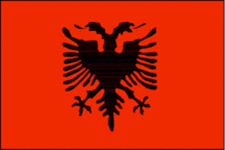Albania
 Flag of Albania | |
| Capital | Tirana |
| Inhabitants | 2.986.952 |
| Language(s) | Albanian |
Introduction
Between 1990 and 1992 Albania ended 46 years of xenophobic Communist rule and established a multiparty democracy. The transition has proven difficult as corrupt governments have tried to deal with high unemployment, a dilapidated infrastructure, widespread gangsterism, and disruptive political opponents. International observers judged legislative elections in 2001 to be acceptable and a step toward democratic development, but identified serious deficiencies that should be addressed through reforms in the Albanian electoral code. [[File:Albania.jpg|thumb|]
Contents |
History
The History of Albania emerges from the prehistoric stage from the 4th century BC, with early records of Illyria in Greco-Roman historiography. The modern territory of Albania has no counterpart in antiquity, comprising parts of the Roman provinces of Dalmatia (southern Illyricum), Macedonia (particularly Epirus Nova), and Moesia Superior. The territory remained under Roman (Byzantine) control until the Slavic migrations of the 7th century, and was integrated into the Bulgarian Empire in the 9th century.
The territorial nucleus of the Albanian state forms in the Middle Ages, as the Principality of Arbër and the Kingdom of Albania. The first records of the Albanian people as a distinct ethnicity also date to this period. The area was conquered in the 15th century by the Ottoman Empire and remained under Ottoman control as part of the Rumelia province until 1912, when the first independent Albanian state was declared. The formation of an Albanian national consciousness dates to the latter 19th century and is part of the larger phenomenon of rise of nationalism under the Ottoman Empire. A short-lived monarchy (1914–1925) was succeeded by an even shorter-lived first Albanian Republic (1925–1928), to be replaced by another monarchy (1928–1939), which was annexed by Fascist Italy during World War II. After the collapse of the Axis powers, Albania became a communist state, the Socialist People's Republic of Albania, which was dominated by Enver Hoxha (d. 1985). Hoxha's political heir Ramiz Alia oversaw the disintegration of the "Hoxhaist" state during the wider collapse of the Eastern Bloc in the later 1980s.
The communist regime collapsed in 1990, and the Republic of Albania was founded in 1991. The old communist party was routed in the elections of March 1992, amid economic collapse and social unrest. Crisis followed crisis throughout the 1990s, peaking in the 1997 Lottery Uprising, that led to mass emigration of Albanians, mostly to Italy, Greece, Switzerland, Germany and to North America. Albania became a full member of NATO in 2009. The country is applying to join the European Union.
Culture
Events
coming soon...
National holidays
Embassies